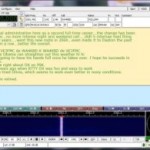It's come to our attention several times over the last few months that listeners who use gPodder to download the Linux in the Ham Shack podcast have had a problem with missing episodes. After a very lengthy investigation we have traced the problem to a bug in one of the plugins that we use for our WordPress site. That problem was leading to a <lastBuildDate> tag in our RSS feed that was far into the future. This meant that gPodder wouldn't update its feed information until that date arrived, causing new episodes not to show up.
We have taken care of the feed building issue, but those who use gPodder must still delete and re-add the Linux in the Ham Shack feed to their podcatcher in order to fix this problem. That will ensure that your version of gPodder has the correct RSS feed build date and you will receive new episodes as they are released.
Thank you for your attention, and if you have any further questions make sure to send them our way!
73 de The LHS Guys
